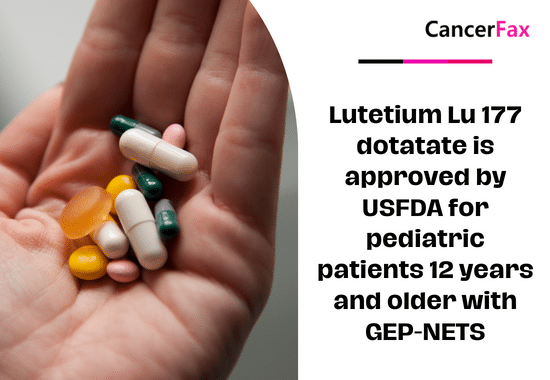Lutetium Lu 177 dotatate is approved by USFDA for pediatric patients
The Food and Drug Administration has approved lutetium Lu 177 dotatate (Lutathera, Advanced Accelerator Applications USA, Inc., a Novartis company) as a way to treat GEP-NETs in kids 12 years and older who are positive for the somatostatin receptor (SSTR). GEP-NETs can be in the foregut, midgut, or hindgut. Permission for the use of Lutetium Lu 177 dotatate in adults was granted in 2018.
This marks the initial approval by the FDA of a radioactive medicine, often known as a radiopharmaceutical, for children aged 12 and above who have SSTR-positive GEP-NETs.
Efficacy and Safety
The approval was granted after evaluating pharmacokinetic (PK), dosimetry, and safety data from the ongoing international study called NETTER-P (NCT04711135). This study focuses on lutetium Lu 177 dotatate and its effectiveness in treating adolescent patients with locally advanced/inoperable or metastatic SSTR-positive GEP-NETs or pheochromocytoma/paraganglioma (PPGL). The study is open-label and single-arm, conducted at multiple centers.
The approval was also granted based on the extrapolation of efficacy results observed in the NETTER-1 (NCT01578239) trial. This clinical trial was a randomized, multicenter, open-label, active-controlled study involving 229 patients with locally advanced/inoperable or metastatic SSTR-positive midgut carcinoid tumors. The findings from this trial provided additional support for the original approval of lutetium Lu 177 dotatate in adult patients.
The safety of the treatment was assessed in a total of 9 pediatric patients in the NETTER-P study, out of which 4 patients had GEP-NETs. The radiation doses that specific organs absorbed and the occurrence of any unfavorable effects after the initial treatment cycle were the main metrics of interest. As an extra outcome measure, the study looked at any bad reactions that happened right away after lutetium Lu 177 dotatate was given. The adverse reaction profile found in the NETTER-P study was comparable to that observed in the adult population.
The suggested dosage for lutetium Lu 177 dotatate is 7.4 GBq (200 mCi) per 8 weeks (± 1 week) for a total of 4 treatments. Administer premedications and concurrent drugs according to the prescribed guidelines. An obligation was issued after the marketing phase to evaluate the enduring safety of lutetium Lu 177 dotatate in teenagers.


